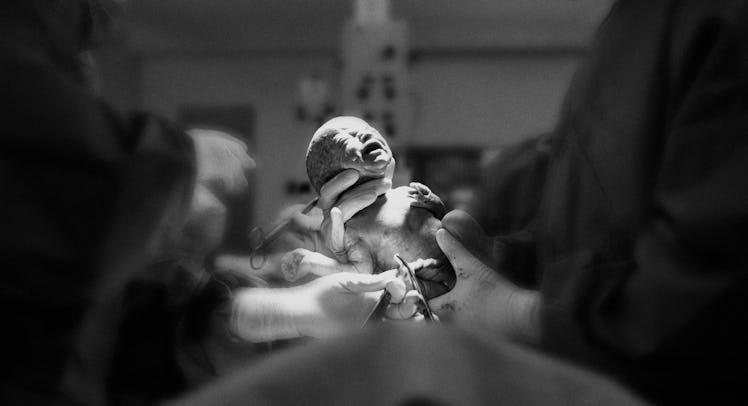What’s It Like For A Baby To Be Born?
Newborns can't tell their parents what childbirth is like for them, but science has a few clues.

If your baby could tell you what it’s like to be born, they would likely describe it as a reactive experience, full of bright lights, new sounds and smells, and likely a lot of pressure. Think New York City, as described in a Jay-Z song. That’s because a newborn’s brainstem is the only part of the brain that’s fully developed, so they exist in pretty much a primitive fight or flight state—expressed as cry or sleep, and sometimes as eat or poop.
“A lot of a newborn’s life is dictated by reflexes, like a sucking reflex or rooting reflex,” Dr. Kathleen Rowland of Rush Medical College, told Fatherly. “So their experiences may be much like ours are when it comes to our reflexes.”
From there, infants are able to hear, smell, taste, perceive, and see anything about 12-inches away, but everything beyond that is a blur. Though operating on pure instincts, there’s evidence that newborn babies have preferences. Studies show that they both prefer the scent of their own mother’s breast milk, as well as their parents’ voices. And a growing body of research suggests that newborns may process pain the same way adults do, going against past assertions that their brains were not developed enough to feel pain. However, a healthy routine childbirth would not be inherently painful, Rowland notes. What they’re feeling is more comparable to being squeezed than anything else. Given all the swaddling they’re gearing up for, newborns are likely into that.
But even if the experience is more unpleasant than that, don’t worry. Research overwhelmingly indicates that infants can’t remember the experience—because kids don’t start forming memories until age two or three, likely as a result of how their brains develop. Even Jill Price, who made headlines in 2008 for being able to recall almost every event in her life due to the condition hyperthymesia, still cannot remember anything before the age of two.
A less conventional approach is that of Jeffrey Von Glahn, a psychologist who maintains that adults can be psychologically affected by the trauma they experienced at childbirth and before age two, even if they cannot remember it. Based partly on studies from the 1980’s that showed children can be affected by trauma even at six weeks old, Glahn guided one of his patients through a series of memories—including that of her birth—as a form of psychotherapy. He later wrote about doing this in his book Jessica: The autobiography of an infant.
“By re-living or re-experiencing, I mean the resumption of a natural process that had been interrupted and not allowed to finish, and held in ‘cold storage’ until the person was in the right therapeutic environment,” Von Glahn told Fatherly. “One cannot just decide to remember one’s birth.” So don’t try this at home.
While the the rebirthing process may be valuable for some, Jessica’s experience is not the norm and parents doing their best probably don’t have to worry about their adult children recreating their crowning experience in a therapist’s office one day. Besides, the effects of childbirth are invariably harder on the moms than babies, Rowland says. “Parents are generally far more rewarded or traumatized by the birth and early childhood experience than children are.”